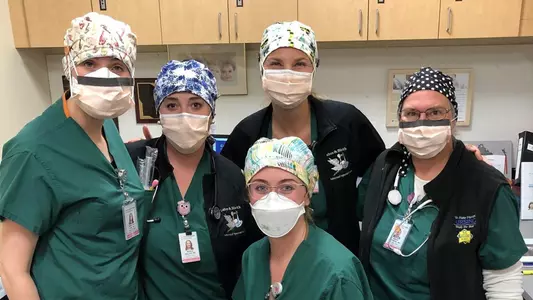University of Connecticut Athletics

UConn Women’s Lacrosse Alumnae Fighting COVID-19
6/18/2020 12:30:00 PM | Women's Lacrosse
Our country and our world have been turned upside down due to the coronavirus pandemic, and no group has been on the front lines throughout like medical workers.
There are multiple UConn women's lacrosse alumnae who have been fighting the COVID-19 virus during this unprecedented time in our country's history.
Christine Link is a registered nurse in the maternal special care unit of Yale New Haven Hospital. Siobhan Wilcox is a travel nurse who just finished an assignment in Reno, Nevada. Lauren Kwasnowski is a physical therapist at Spaulding Hospital in Cambridge, Massachusetts. Alyson Fazio is an oncology nurse at multiple hospitals in the Greater Boston area, but she worked with coronavirus patients at the Boston Hope Medical Center field hospital during the pandemic's surge.
COVID-19 has impacted the jobs and lives of all these individuals. Link, who graduated from UConn in 2002, said there was a fear going to work unlike anything she had ever experienced.
"I have never been scared or nervous to go to work, but since COVID, I have been anxious," Link said. "I am not scared to get COVID myself, I know that I am taking a risk by working in a hospital, and I choose that risk; I'm scared I'm going to bring COVID home to a family member and they become sick and/or die. It will most likely be that I passed it on to them."
Wilcox, who graduated in 2014, also alluded to the added anxiety of working in a hospital during the pandemic.
"In the beginning of the pandemic, when I walked into work you could feel the anxiety from not only my co-workers, but upper management as well," Wilcox said. "I think this was partially because no one really knew what was coming and no one knew exact information about the virus … The biggest change was the heightened anxiety and feeling of the unknown. We already deal with this every time we come to work but during the pandemic it was much worse."
Fazio and Kwasnowski, who graduated together in 2016 and now live together as medical workers in Greater Boston, said the hardest change was the social distancing aspect.
"In addition to the general concerns working in healthcare brings such as my personal health and the health of the patients surrounding me, it has been very difficult social distancing from family and friends," Fazio said. "After long shifts and hours, it is challenging to not surround yourself with the ones you love."
"Change is tough to begin with, and not having a social outlet outside of work made it even tougher," Kwasnowski added. "As I started treating patients recovering from COVID-19, it was scary thinking about the risk of exposure, not only for me, but for my roommate and boyfriend. Those were the only people I was seeing until recently. It was scary not knowing what to expect and not knowing when things would get better. It was scary not knowing when I would see my family again."
Fazio and Kwasnowski said that living together with someone going through similar things has really helped with their struggles. They have also made a pact to only talk about the virus for 10 minutes after work every day to not let it consume them.
Another challenge facing medical workers all over the country was the shortage of personal protective equipment (PPE), resulting in a need for hospitals to reuse things such as masks.
"We learned in school that N95 masks are a one-time use," Link said. "Since COVID, we have been reusing masks because of the shortage. This would have been unthinkable before COVID."
But through it all, these amazing individuals still put their patients first.
"As a healthcare professional, your desire to help people overrides all of those fears," Kwasnowski said. "You do what you need to in order to prepare every day to provide the best care to these patients. You hope you might brighten their day just a little bit."
"For our COVID patients, they are usually alone," Link said. "They are scared. But my coworkers and I still don all our PPE to give our patients the same care. Our drive to help others hasn't changed."
All these alums say their time as UConn lacrosse players really helped to shape them into the people and the medical professionals they are today.
"As a student-athlete at UConn, I learned how to work with a team, how to work for a team, and how to push through difficult times with those surrounding you," Fazio said. "I would say many lessons learned from playing lacrosse at UConn have transferred into my career in healthcare. In lacrosse, we constantly had to adapt and adjust in order to reach our common goal. During this pandemic, we received new information every day and had to continuously alter methods for the better of the patient. I feel prepared for any challenge that comes my way due to my experiences in lacrosse at UConn. I am forever grateful to be a Husky!"
Link, Wilcox, Fazio and Kwasnowski were great in their various roles as UConn lacrosse players, but they are playing an even bigger role now for humanity and are thriving in it.


















